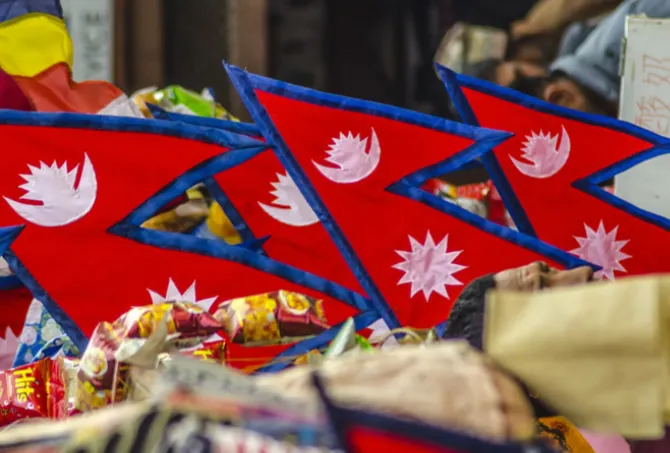
Thousands of people took to the streets of Kathmandu on 23 November demanding the restoration of the monarchy, the reestablishment of Nepal as a Hindu state, and the scrapping of federalism
The protests are part of the “Rastra, Rastriyata, Dharma, Sanskriti ra Nagarik Bachau”—loosely translated to “Save the nation, nationalism, religion, culture, and citizens”— campaign led by Durga Prasai. Prasai is a Nepali businessman with known, and now reportedly severed, links to Prime Minister Pushpa Kamal Dahal “Prachanda” and former Prime Minister KP Sharma Oli.
Nepal has seen a series of pro-monarchy and pro-Hindu protests since the abolition of its 240-year monarchy. In 2023 alone, there have been rallies in Dharan, Nepalgunj, and a few other districts.
Nepal has seen a series of pro-monarchy and pro-Hindu protests since the abolition of its 240-year monarchy. In 2023 alone, there have been rallies in Dharan, Nepalgunj, and a few other districts.
The Prasai-led protests assume significance as they have “alarmed the country’s top political brass,” yielding responses that may have long-term impacts—notably, the Nepali government’s recent ban on TikTok. Shortly before the Prasai-led protests, the Nepali government banned TikTok on 13 November, citing the app’s negative effects on social harmony. However, many contend that the app was banned to curb Prasai’s posts criticising Oli and Prachanda, which had gained significant traction.
In this context, the ban has been deemed an attack on freedom of speech and expression. It was notably imposed without prior stakeholder consultation during the festival of Tihar—when most of the country remains closed. Fourteen writ petitions against the ban on TikTok have been filed with the Supreme Court. The court has ordered the government to show cause but has not yet conducted scheduled hearings due to other pending cases.
Experts have questioned the government’s decision to ban the app instead of regulating it. Nepal’s Ministry of Communication and Information Technology contends there is no way to regulate TikTok, creating apprehension about the fate of other social media platforms—including Facebook, Instagram, and X (formerly Twitter)—operating in Nepal. Social media platforms are already facing increasing regulation, with the recently passed “Directives on the Operation of Social Networking 2023” requiring them to set up offices in Nepal. The directive also includes a 19-point not-to-do list for social media platform users. Some fear the government is “testing the waters” with TikTok and may take restrictive approaches to other social media platforms as well.
Nepal’s Ministry of Communication and Information Technology contends there is no way to regulate TikTok, creating apprehension about the fate of other social media platforms—including Facebook, Instagram, and X (formerly Twitter)—operating in Nepal.
While the Prasai-led demonstrations have primarily been in the limelight, the Rastriya Prajatantra Party (RPP)—Nepal’s largest pro-monarchy force, which has 14 seats in the House of Representatives—has also recently stepped up its activities. The party recently organised the unveiling of a statue of King Prithvi Narayan Shah—considered the founder of modern Nepal—in Jhapa. This was notably attended by former King Gyanendra Bir Bikram Shah—Nepal’s last monarch, who maintains a strong support base. The party has held several large demonstrations over the past year, and plans to run awareness campaigns for two months starting mid-December to “lay the ground for an uprising.”
Although the RPP and Prasai distance themselves from each other, their combined efforts appear to have strengthened non-republican, non-secular sentiments in Nepal.
Former Prime Minister Sher Bahadur Deuba and President of the Nepali Congress shared that his party—part of Nepal’s incumbent coalition government—is open to discussing secularism but deems the restoration of monarchy “unimaginable.” Additionally, reports indicate that a significant portion of the Nepali Congress membership supports the restoration of a Hindu state. Prime Minister Prachanda, however, maintains that his government will not budge on the secular Constitution, contending that the collapse of secularism would result in the collapse of the Nepali republic altogether.
Spells of anti-secularism are not out of the ordinary in Nepal’s political landscape. The categorisation of Nepal as a “secular state” in the seventh and current Constitution was not a universally-welcomed change. A majority of Nepalis wanted “secularism” to be replaced by “Hindu” or “religious freedom.” Since the promulgation of this Constitution in 2015, Nepal has seen sporadic rallies demanding a re-establishment of Nepal as a Hindu state.
The ongoing movement, however, assumes significance as it comes amid instances of religious intolerance and shortly precedes the National Assembly elections slated for 25 January 2024. Media reports contend that parties which are against doing away with the country’s secular identity are likely to perform poorly in the upcoming elections.
The trajectory of pro-Hindu and pro-monarchy tendencies is hard to map in a country where leaders and parties are notorious for flip-flopping. Nevertheless, it is important to pay attention to the root cause of these tendencies—a clear disillusionment with the federal political system and democratically-elected leaders who have failed to bring the socio-economic transformation they promised.
Pratistha Rijal is a South Asia Associate at The Asia Group in New Delhi. She holds a Master’s in Asian Studies from Georgetown University.
The views expressed above belong to the author(s). ORF research and analyses now available on Telegram! Click here to access our curated content — blogs, longforms and interviews.




 PREV
PREV


